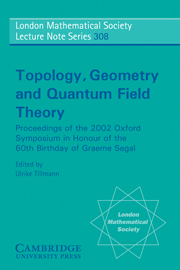 Topology, Geometry and Quantum Field Theory
Topology, Geometry and Quantum Field Theory Book contents
- Frontmatter
- Contents
- Preface
- Participants
- Introduction
- Part I Contributions
- 1 A variant of K-theory: K±
- 2 Two-vector bundles and forms of elliptic cohomology
- 3 Geometric realization of the Segal–Sugawara construction
- 4 Differential isomorphism and equivalence of algebraic varieties
- 5 A polarized view of string topology
- 6 Random matrices and Calabi–Yau geometry
- 7 A survey of the topological properties of symplectomorphism groups
- 8 K-theory from a physical perspective
- 9 Heisenberg groups and algebraic topology
- 10 What is an elliptic object?
- 11 Open and closed string field theory interpreted in classical algebraic topology
- 12 K-theory of the moduli space of bundles on a surface and deformations of the Verlinde algebra
- 13 Cohomology of the stable mapping class group
- 14 Conformal field theory in four and six dimensions
- Part II The definition of conformal field theory
- Foreword and postscript
- The definition of CFT
- References
5 - A polarized view of string topology
Published online by Cambridge University Press: 06 November 2009
- Frontmatter
- Contents
- Preface
- Participants
- Introduction
- Part I Contributions
- 1 A variant of K-theory: K±
- 2 Two-vector bundles and forms of elliptic cohomology
- 3 Geometric realization of the Segal–Sugawara construction
- 4 Differential isomorphism and equivalence of algebraic varieties
- 5 A polarized view of string topology
- 6 Random matrices and Calabi–Yau geometry
- 7 A survey of the topological properties of symplectomorphism groups
- 8 K-theory from a physical perspective
- 9 Heisenberg groups and algebraic topology
- 10 What is an elliptic object?
- 11 Open and closed string field theory interpreted in classical algebraic topology
- 12 K-theory of the moduli space of bundles on a surface and deformations of the Verlinde algebra
- 13 Cohomology of the stable mapping class group
- 14 Conformal field theory in four and six dimensions
- Part II The definition of conformal field theory
- Foreword and postscript
- The definition of CFT
- References
Summary
Abstract
Let M be a closed, connected manifold, and LM its loop space. In this paper we describe closed string topology operations in h*(LM), where h* is a generalized homology theory that supports an orientation of M. We will show that these operations give h*(LM) the structure of a unital, commutative Frobenius algebra without a counit. Equivalently they describe a positive boundary, two-dimensional topological quantum field theory associated to h*(LM). This implies that there are operations corresponding to any surface with p incoming and q outgoing boundary components, so long as q ≥ 1. The absence of a counit follows from the nonexistence of an operation associated to the disk, D2, viewed as a cobordism from the circle to the empty set. We will study homological obstructions to constructing such an operation, and show that in order for such an operation to exist, one must take h*(LM) to be an appropriate homological pro-object associated to the loop space. Motivated by this, we introduce a prospectrum associated to LM when M has an almost complex structure. Given such a manifold its loop space has a canonical polarization of its tangent bundle, which is the fundamental feature needed to define this prospectrum. We refer to this as the ‘polarized Atiyah-dual’ of LM. An appropriate homology theory applied to this prospectrum would be a candidate for a theory that supports string topology operations associated to any surface, including closed surfaces.
- Type
- Chapter
- Information
- Topology, Geometry and Quantum Field TheoryProceedings of the 2002 Oxford Symposium in Honour of the 60th Birthday of Graeme Segal, pp. 127 - 154Publisher: Cambridge University PressPrint publication year: 2004
- 23
- Cited by


